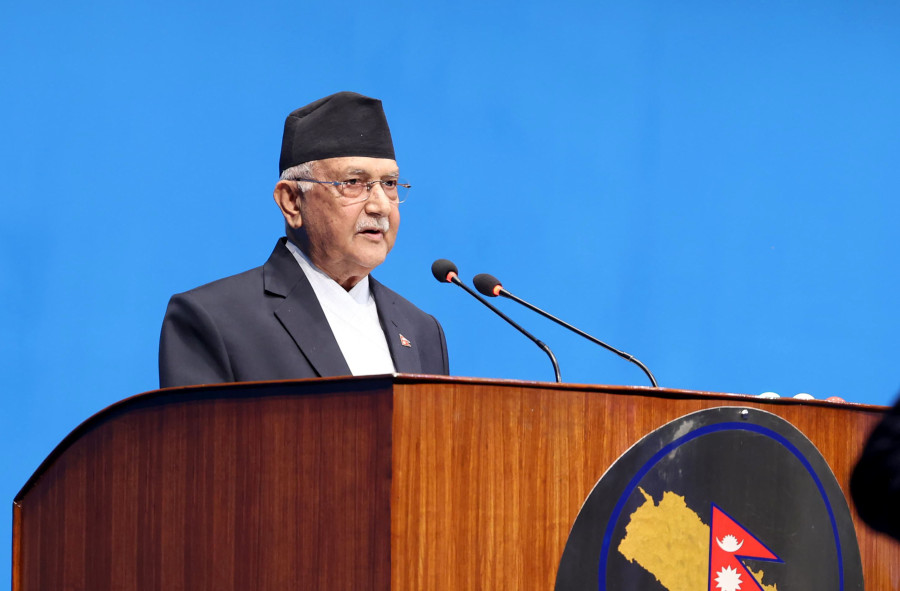Politics
PM Oli defends transitional justice process, victims say they feel left out
Insurgency victims complain of not being consulted before crucial appointments.
Binod Ghimire
Even as a group of conflict victims refuse to cooperate with the two transitional justice commissions, Prime Minister KP Sharma Oli has claimed that both the government and commissions will engage with victims to bring the peace process to a close.
Responding to a concern raised by a lawmaker in the House of Representatives on Wednesday, Oli reiterated that his government is fully committed and sensitive to ensuring justice to the victims of the 1996-2006 Maoist insurgency.
Nepali Congress lawmaker Maina Karki, also a former chair of the Conflict Victims Common Platform, had asked how the commissions could provide justice when the victims have accused the prime minister and top leaders of ignoring them while appointing their office bearers.
“I am confident that in the coming days, the office bearers of the commissions will sit with the victims, hold discussions, and take forward the remaining tasks of the peace process,” he said “We [the government] are continuously engaged in discussions with conflict victims at various levels. Concluding the peace process is a matter of concern and interest for all.”
Various victims’ groups have refused to cooperate with office bearers of the Truth and Reconciliation Commission and the Commission of Investigation on Enforced Disappeared Persons, claiming that the government pushed through their appointments without consulting them.
Ignoring their reservations, the government on May 14 appointed a five-member team led by Mahesh Thapa in the truth commission, and an equal number of team members under Leela Devi Gadtaula in the disappearance commission. The victims’ groups have claimed that the appointments were made ignoring their calls for a victim-centric transitional justice process.
Countering Oli’s claim, victims say that they were consulted just once and only after the commissions were formed. “We had a meeting with a ruling party team led by the home minister on June 30. Back then, we had agreed to hold a longer meeting a week later, but that did not happen,” said Suman Adhikari, founding chair of the platform.
He said the single meeting was arranged during the visit of Rory Mungoven, the Asia Pacific chief of Office of the United Nations High Commissioner for Human Rights, in an attempt to show to the international community that the government was engaging with victims.
“It is clear that the consultations had nothing to do with addressing our concerns,” said Adhikari, claiming the commission’s have also made no serious effort to engage them.
It is not just the victims who are critical of the government’s approach to transitional justice. The National Human Rights Commission (NHRC) has also concluded that building trust with victims is a must for a successful conclusion of the transitional justice process.
It has sent a similar recommendation to the United Nations Human Rights Council in its Universal Periodic Review. “While the Nepal government has taken steps to advance the peace process by reconstituting the commissions, the transitional justice process continues to face challenges in implementation and credibility as many victim organisations and the civil society organisations are opposing the appointment process of commission and expressed reservations against newly formed bodies,” reads the recommendation.
“The exclusion of victims from key decision-making processes undermines trust and raises questions about the commission’s ability to deliver a victim-centred approach.”
NHRC officials have been making similar suggestions to the transitional justice commissions. During a meeting with the disappearance commission officials on Tuesday, the commission’s chair, Top Bahadur Magar, stressed the need for winning victims’ trust.
“He clearly said the success of the transitional justice process depends on how well the commissions can engage victims. He asked them to take each step only by heeding victims’ concerns,” said Surya Dhungel, a NHRC member who was present in the meeting. “Gadtaula said her commission wants to engage victims in all decisions.”




 23.27°C Kathmandu
23.27°C Kathmandu













